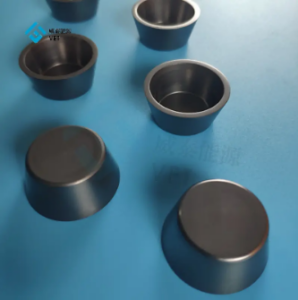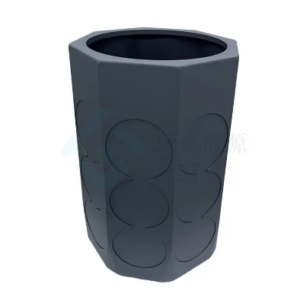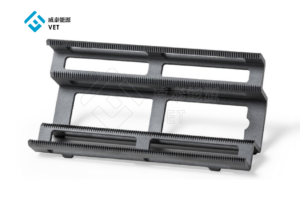について SiCの粉砕のバレル 産業効率を高めるためのピボタルツールとして立っています。 その優れた耐久性と耐熱性は、さまざまな分野で不可欠です。 物質の汚染を防ぎ、長寿を保障する、その低い摩耗の損失からの企業利益。 高温環境での研削バレルは、品質に妥協することなく性能を維持します。 その費用効果が大きいのは、その魅力を増幅し、伝統材料の長期節約を提供します。 精密・信頼性を追求する企業として、SiCの粉砕バレルは高度材料の生産の多目的で、精巧な部品として出ます.

要点
- SiCの粉砕のバレルの提供 例外的な耐久性および耐久性、従来の材料より長い寿命5から10倍延長します.
- とりあえず 高い熱伝導性 高温産業環境に理想的な熱放散を可能にします.
- SiCの粉砕バレルに投資することは維持および取り替えの必要性を減らすことによって重要な長期費用節約につながります.
- これらのバレルは、鉱業、化学加工、製造などの業界において、一貫した精密研削、重要性を確保し、生産性を高めます.
- SiCの粉砕のバレルは環境に優しい練習と一直線に並ぶエネルギー消費および無駄を最小にすることによって持続可能性に貢献します.
- 彼らの汎用性は、リチウム電池や太陽光発電業界など、さまざまな用途に適しています.
- SiCの粉砕のバレルを選ぶことはだけでなく、操業効率を高めるだけでなく、プロダクトの良質の標準を達成するために企業を支えます.
SiC研削バレルの理解
構成および特性
炭化ケイ素の特性
Silicon carbide, 多くの場合、SiC と略して, その驚くべき特性のために際立っています. この化合物は、高い硬度と強度を発揮し、研削用途に最適です。 その耐摩耗性は研摩の環境で長寿を、保障します。 また、研削工程における効率的な放熱を容易にする優れた熱伝導性を有します。 研削工具の寿命を延ばすため、過熱を防止します。 更に、炭化ケイ素の化学的安定性は腐食に対して抵抗力があり、劣化することなく過酷な化学環境に耐えることができます.
製造工程
SiCの粉砕バレルの製造工程は複数の精密なステップを伴います。 当初、高純度炭化ケイ素粉末は焼結プロセスを受けています。 これは、粉末を溶かすことなく固体塊に溶ける温度に加熱することを含みます。 焼結材料は、高度な加工技術を使用してバレルに形成されます。 このプロセスは、バレルが構造の完全性を維持し、産業使用のための必要な仕様を満たしていることを確認します。 結果は、様々な要求の厳しい用途に適した、耐久性の高い性能を兼ね備えた製品です.
オペレーションメカニズム
研削の仕組み
SiCの粉砕バレルはまっすぐなけれども有効なメカニズムによって作動します。 バレルが回転するように、炭化ケイ素粒子の研摩の行為は中置かれた材料を粉砕します。 この研削アクションは、材料を微小粒子に減らし、目的の一貫性を達成します。 SiCの高硬度は、セラミックや金属などの堅い材料を扱う場合でも、研削プロセスが効率的であることを確認します。 この仕組みは、生産性を高めるだけでなく、最終製品の均一性を確保します.
産業プロセスにおける役割
産業設定では、, SiCの粉砕のバレル 重要な役割を果たします。 高度なセラミックスや電子機器の生産など、精度と一貫性を必要とするプロセスに不可欠です。 高温やレジストの摩耗を処理する能力は、他の材料が失敗する環境に不可欠です。 例えば、採掘産業では、これらのバレルは、鉱石の粉砕と粉砕を容易にし、効率的な材料処理に貢献します。 彼らの汎用性は、化学的処理に拡張します。, 彼らは混合し、加工作業を支援します。, エンド製品が厳格な品質基準を満たしていることを確認します。.
SiC研削バレルの利点
耐久性と寿命
Resistance to Wear and Tear
耐久のSiCの粉砕のバレルは摩耗および破損に例外的な抵抗を提供します。 炭化ケイ素の固有の硬度および強さはこれらのバレルが研摩の環境に効果的に抗することを保障します。 一般的な耐摩耗性材料と比較して、炭化ケイ素の粉砕バレルの耐用年数は5〜10倍延長します。 この長寿はより少ない取り替えに翻訳し、それに一貫した性能を要求する企業のための信頼できる選択をするダウンタイムを減らしました.
メンテナンスと交換コスト
機器のメンテナンスと交換に関する重要なコストは、多くの場合、産業が直面する。 SiCの粉砕バレルは強い構造および延長寿命によるこれらの費用を最小にします。 摩耗へのその高い抵抗は維持の介入の頻度を減らします。 その結果、事業は運用コストを削減し、生産性を向上させます。 SiCの粉砕バレルに投資することによって、会社は頻繁に装置の修理ではなく成長および革新に焦点を合わせる資源を効率的に割り当てることができます.
耐熱性
Performance in High-Temperature Environments
SiCの粉砕のバレルは高温環境で驚くべき性能を発揮します。 炭化ケイ素の高い熱伝導性は粉砕プロセスの間に過熱を防ぐ有効な熱放散を可能にします。 この機能は、バレルが極端な条件下であっても、構造的整合性と機能性を維持していることを保証します。 金属加工や精密加工などの高温設定で動作する業界は、SiC研削バレルの信頼性と効率性から大幅に恩恵を受けています.
Impact on Efficiency
SiCの粉砕のバレルの熱抵抗は産業効率に直接影響を与えます。 挑戦的な条件で最適な性能を維持することで、これらのバレルは製造プロセスの全体的な生産性を高めます。 高温で分解することなく動作する能力は、一貫した出力品質を保証します。 その結果、産業は生産目標をより効果的に満たすことができます。廃棄物の削減と資源利用の最大化を実現します.
費用対効果
初期投資対長期貯蓄
SiCの粉砕バレルの初期投資は従来の材料と比較して高いかもしれませんが、長期節約は相当します。 これらのバレルの延長寿命および減らされた維持の条件は時間の上の重要な費用減少に導きます。 企業は、頻繁な交換や修理の必要性を最小限に抑えるため、SiCの粉砕バレルを選択することにより、投資に対する有利なリターンを達成することができます。 この費用効果が大きいのは、持続可能な経済的ソリューションを求める業界にとって魅力的な選択肢です.
エネルギー効率
SiCの粉砕のバレルは産業操作のエネルギー効率に貢献します。 高い熱伝導性により、研削工程においてエネルギーが有効に活用されることが可能になります。 効率よく熱を散らすことで、エネルギー消費を削減し、不要な電力使用を防止します。 この省エネ属性は、世界中の産業における持続可能な実践に重点を置いています。 SiCの粉砕バレルを採用した企業は、エネルギーコストの削減に寄与しながら、環境の責任を高めることができます.
業界への応用

鉱山およびミネラル処理
粉砕および粉砕
鉱山および鉱物処理の企業では、SiCの粉砕のバレルは重要な役割を担います。 高い硬度および強さは粉砕および粉砕操作にとって理想的にします。 バレルの研摩作用は効率的により細かい粒子に鉱石の大きい塊を減らします、それ以上の処理を促進します。 この効率性は生産性を高めるだけでなく、最終製品が希望する仕様を満たしていることを確認します。 耐久性の耐久性 silicon carbide バレルは鉱山の環境で典型的な粗い条件に抵抗することを保障しま、連続的な操作のための信頼できる解決を提供します.
材料の処理
鉱山の材料の処理は厳しい摩耗および破損に耐えることができる装置を要求します。 耐摩耗性に優れたため、この側面のSiC研削バレルは優れています。 研磨材を扱い、装置の故障のリスクを最小限に抑えます。 この信頼性はダウンタイムとメンテナンスコストを削減し、マイニング操作をスムーズに実行できます。 極端な条件下でのパフォーマンスを維持するバレルの能力は、鉱業分野における材料の効率的な処理に不可欠のツールになります.
化学処理
混合および製粉
混合および製粉の適用のSiCの粉砕のバレルの使用からの化学処理の企業利点かなり。 炭化ケイ素の高い熱伝導性は、これらのプロセスの間に過熱を防ぐ有効な熱放散を保障します。 このプロパティは、化学化合物の完全性を維持することに不可欠であり、その反応が制御された条件下で起こることを保証します。 高温および腐食性の環境に耐えるバレルの能力は、化学処理の操作の全体的な効率を高める広範囲の化学物質を扱うためにそれらを理想的にします.
耐食性
耐食性は化学処理の重要な条件です。 SiCの粉砕のバレルは積極的な化学薬品からの腐食に抵抗力があるそれを作る顕著な化学安定性を提供します。 この抵抗は装置の寿命を拡張し、頻繁な取り替えの必要性を減らします。 作業コストを削減し、生産性を向上し、バレルは長時間にわたる性能を維持します。 腐食性の環境の炭化ケイ素の信頼性は化学処理の適用の価値をアンダースコアします.
製造・生産
精密研削加工
製造・生産において、精密研削は、製品の品質向上に欠かせないものです。 SiCの粉砕のバレルは高い硬度および耐久性による必要な精密を提供します。 研削工程の均一性を確保し、様々な材料に一貫した結果を生み出します。 この精度は、電子機器や航空宇宙などの業界で特に重要で、正確な仕様が重要である。 精密な粉砕を渡すバレルの能力は製造されたプロダクトの質そして信頼性を高めます.
表面仕上げ
表面仕上げはSiCの粉砕バレルのexcelsの別の区域です。 研摩特性により、幅広い材料に滑らかな研磨面を実現。 この機能は、自動車や家電など、審美的にリースし、機能的な仕上げを必要とする業界で不可欠です。 バレルの耐久性は、表面仕上げ用途に費用対効果の高いソリューションを提供し、時間をかけて性能を維持することを保証します。 高品質な仕上がりをお届けすることにより、SiC研削バレルは、製造された製品の全体的な価値と魅力に貢献します.
Comparison with Other Materials
SiC対従来の粉砕材料
Performance Metrics
シリコンカーバイド(SiC)研削バレルは、従来の研削材と比較して、優れた性能メトリックを発揮します. シスコ そのせいで立つ 例外的な硬度および熱抵抗、粉砕の塗布で重要である。 従来の材料は頻繁にこれらの区域で、高められた摩耗および減らされた効率に導きます。 SiCの高熱伝導性により、効率的な放熱、過熱防止、長寿命化を実現します。 従来の材料が劣化する可能性がある高温環境では、この特性は特に有益です。 SiCの優れた特性は、高性能研削ソリューションを必要とする業界に好ましい選択をします.
コスト分析
コストを分析するとき、SiC研削バレルは長期節約のための説得力のあるケースを提示します。 初期投資は従来の材料よりも高いかもしれませんが、SiCバレルの延長寿命および減らされた維持の条件は導きます コストを大幅に削減. . 従来の材料は頻繁に摩耗および破損による頻繁な取り替えを、高める運用コスト要求します。 つまり、SiCの耐久性はダウンタイムとメンテナンスコストを最小限に抑え、投資に有利なリターンを提供します。 経済的で持続可能なソリューションを求める産業は、SiCの粉砕バレルが費用対効果の高いオプションであることを見つける.
代替方法上の利点
効率および出力
SiCの粉砕のバレルは効率および出力の面の代わりとなる粉砕方法上の別の利点を提供します。 SiCの高い硬度および強さは堅い材料と、一貫した粉砕の性能を保障します。 最終製品の生産性と均一性を向上する効率性です。 代替方法は、出力品質の変化につながる精度と一貫性の同じレベルを達成するために苦労することができます。 要求条件下で性能を維持できるSiCの能力は、効率と信頼性を優先する業界において価値ある資産となります.
環境への影響
SiC研削バレルの環境への影響は、代替方法と比較してエクセルを発揮する別の領域です。 SiCの高熱伝導性は、研削加工時の消費電力を削減し、エネルギー効率に貢献します。 この省エネ属性は、世界中の産業における持続可能な実践に重点を置いています。 また、SiCバレルの長寿は、頻繁な交換物から発生する廃棄物を削減し、さらなる環境のアピールを強化します。 SiCの粉砕のバレルを採用する企業は減らされたエネルギー費用および無駄から寄与している間環境の責任を改善できます.
ケーススタディや成功事例
寧波VETエネルギー技術有限公司の実装
プロジェクトの概要
ニンポー VET エネルギー技術 SiCの粉砕バレルを彼らの操作に統合することによって生産の効率を高めるためにプロジェクトに組み込まれるCo.。 同社は、エネルギー分野における革新的なアプローチで知られており、研削プロセスの耐久性と性能を向上させる必要があります。 摩耗および腐食への高力、硬度および抵抗による炭化ケイ素の粉砕のバレルを選びました。 これらの属性は、生産環境の要求条件に理想的な選択をしました.
結果と利点
Ningbo VET Energy Technology Co.のSiC研削バレルの実装 重要な利点. . 会社は取り替えおよび維持の頻度を減らす彼らの粉砕装置の寿命のマークされた増加を、観察しました。 コストを大幅に削減し、ダウンタイムを最小限にすることで、途切れない生産を実現します。 また、バレルの耐久性が向上し、一貫した製品品質を確保し、エネルギー業界に必要な厳しい基準を満たしています。 このプロジェクトの成功は、SiC の粉砕バレルの価値を産業効率および信頼性を高めます.
その他の業界事例
生産性の向上
様々な業界において、SiC研削バレルの採用により、注目の生産性向上が進んでいます。 たとえば、マイニング部門では、企業が、研磨材を効率的に処理するバレルの能力のためにスループットを増加させました。 炭化ケイ素の高い硬度および強さはより高い出力率に導くより速い粉砕および粉砕プロセスを可能にします。 この効率性は生産性を向上するだけでなく、最終製品が目的の仕様を満たし、全体的な運用効率を向上させることを保証します.
Cost Savings
SiCの粉砕バレルを操作に統合させた企業は重要な費用節約を経験しました。 これらのバレルの延長寿命は頻繁に取り替えのための必要性を減らします維持費を下げます。 企業は、バレルの耐久性がダウンタイムを最小限に抑え、機器の信頼性を高めるため、運用コストを削減するメリットがあります。 さらに、SiC研削バレルのエネルギー効率は、電力消費量を削減し、持続可能な慣行とさらなるコスト削減に貢献します。 これらの利点は、SiCの粉砕は、プロセスを最適化し、ボトムラインを改善しようとする業界のための費用対効果の高いソリューションを樽作ります.
新興産業におけるSiC研削バレル
リチウム電池の企業
電池生産における役割
リチウム電池産業はSiCの粉砕バレルの統合の重要な進歩を目撃しました。 これらのバレルは、電池部品で使用される材料の精密な粉砕を保証することによって、製造工程で重要な役割を果たします。 シリコンカーバイドの高硬度・耐摩耗性により、電池生産に関わる研磨材の取り扱いに理想的です。 研削バレルは、リチウム電池の所望の電気化学的特性を達成するために不可欠である粒子サイズの減少を容易にします。 粒径の一貫性を保ち、SiC研削バレルは、電池の全体的な効率と性能に貢献します.
効率の利益
リチウム電池業界における効率性の向上は、SiC研削バレルの使用に明らかです。 炭化ケイ素の高い熱伝導性は粉砕の間に有効な熱放散を可能にし、過熱を防ぎ、最適性能を保障します。 この効率は、生産時間を短縮し、エネルギー消費を削減します。 その結果、メーカーは低価格で高品質のバッテリーを生産し、市場で競争力を高めることができます。 SiCの粉砕のバレルの耐久性はまた維持の条件を減らします、操作上の効率に貢献します.
太陽光発電 業界トップ
ソーラーパネル製造への応用
太陽光発電業界では、ソーラーパネル製造においてSiC研削バレルは欠かせないツールとなっています。 シリコンウェーハ、太陽電池の重要な成分を粉砕するために使用されます。 SiCの粉砕バレルによって提供される精密そして一貫性はウエハが有効な太陽エネルギー転換のために要求される厳しい品質基準を満たしていることを保障します。 シリコンカーバイドの高硬度は、ウェーハの精密な形状と仕上げを可能にし、日光にさらされる表面面積を最大限に高める必要があります。 ソーラーパネルの全体的な効率性を高め、太陽光エネルギーの活用に効果的です.
環境面でのメリット
太陽光発電業界におけるSiC研削バレルの使用環境上の利点は大幅です。 ソーラーパネルの生産の効率化により、これらのバレルはクリーンで再生可能エネルギーの発生に貢献します。 SiC研削バレルのエネルギー効率は、製造工程におけるエネルギー消費を削減するため、持続可能性に対する業界のコミットメントと一直線に合わせています。 また、シリコンカーバイドバレルの長寿命化により、頻繁な交換物から発生する廃棄物を最小限に抑え、さらなる環境対応を強化します。 業界がカーボンフットプリントを削減する努力として、SiC研削バレルの採用は、よりグリーンな生産慣行を実現する努力をサポートしています.
未来のトレンドとイノベーション
SiC技術の進歩
新しい材料構成
シリコンカーバイド(SiC)技術の進化により、さまざまな産業におけるイノベーションを推進しています。 研究者はSiCの粉砕バレルの特性を高めるために新しい材料の構成を探検しています。 硬さ、熱伝導性、耐摩耗性の向上を目指した取り組みです。 例えば、SiCとアルミニウム(SiC/Al複合材料)との統合により、高剛性・熱伝導性により、航空宇宙および自動車用途における約束が示されています。 この複合材料は、軽量で耐久性のユニークな組み合わせを提供し、要求の厳しい環境に理想的です.
Enhanced Performance Features
SiCの粉砕のバレルの高められた性能の特徴は企業がより有効で、信頼できる解決を要求するようにますますます重要になっています。 これらのバレルのエネルギー効率そして寿命を改善する焦点はあります。 SiCの微細構造を最適化することにより、メーカーは優れた熱伝導性と電気的特性を得ることができます。 この最適化により、研削工程における熱放散とエネルギー消費を削減できます。 その結果、操業コストを削減し、生産性の向上に寄与する産業が増加します.
潜在的市場成長
産業需要の予測
要求のための SiCの粉砕のバレル 今後数年で大きく成長していく予定です。 自動車、電子機器、半導体製造などの分野での効率的な原材料の需要が高まっています。 SiCの高い熱伝導性および硬度はパワーエレクトロニクスおよび産業機械のためのそれの好まれた選択をします。 今後も、産業が持続可能で費用対効果の高いソリューションを求めていく中で、SiC研削盤の市場は急速に拡大する見込みです.
新たなアプリケーション
SiC研削バレルの採用用途は、市場成長に貢献しています。 電気自動車(EV)業界において、SiCインゴットは、優れた熱伝導性と高電圧抵抗により人気を博しています。 これらのプロパティは、電源や高周波デバイスで使用するのに理想的です。 また、太陽光発電業界は、精密・効率が重要なソーラーパネル製造にSiC研削バレルを活用しています。 省エネルギー消費や廃棄物などのSiCの環境上の利点は、産業の持続可能性へのコミットメントと一致します.
SiCの粉砕のバレルは産業効率をかなり高める利点の多数を提供します。 高い硬度および耐久性は頻繁に取り替えのための必要性を減らす長い耐用年数を保障します。 産業は高温環境の性能を維持するために優秀な熱伝導性に頼ることができます。 これらの属性は、採掘から化学処理まで、さまざまな用途に理想的な選択肢です。 SiCの粉砕バレルを採用することにより、業界は、コストを大幅に削減しながら一貫した高品質の結果を得ることができます。 この汎用性の高いツールは、材料技術の革新に対するテストとして立ち、性能と信頼性の向上を約束します.
よくあるご質問
SiCの粉砕バレルは何ですか?
SiCの粉砕のバレルは高い硬度および耐久性のために知られている炭化ケイ素からなされる用具です。 産業は、耐久性と効率性から恩恵を受ける材料を粉砕し、粉砕するためにそれを使用します.
炭化ケイ素は産業効率を高めますか?
シリコンカーバイドは、優れた硬度と熱伝導性により、産業効率を高めます。 これらの特性は、効率的な研削プロセスを可能にし、エネルギー消費を減らし、機器の寿命を延ばすことができます.
なぜ従来の材料にSiCの粉砕のバレルを選ぶか?
業界は、優れた耐久性と耐熱性のためにSiC研削バレルを好む。 従来の材料とは異なり、SiCはより長い耐用年数を提供し、より少ない維持を要求し、費用節約に時間を費やします.
SiCの粉砕バレルが一般的に使用される産業ですか?
SiCの粉砕のバレルは適用を見つけます 鉱業、化学加工、製造など、さまざまな産業で。 過酷な条件に耐える能力は、高い摩耗と耐食性を必要とする環境に理想的です.
SiCの粉砕バレルが持続可能性に貢献する方法は?
SiCの粉砕バレルはエネルギー消費および無駄を減らすことによって持続可能性に貢献します。 長い寿命は頻繁に取り替えの必要性を、環境に優しい練習と一直線に合わせ、環境影響を減らす最小にします.
SiCの粉砕のバレルは高温環境を扱うことができますか?
はい、SiCの粉砕は高温環境で加速します。 高い熱伝導性は、極端な条件下でも性能と構造の完全性を維持し、効率的な熱放散を保証します.
SiCの粉砕バレルを使用する費用メリットは何ですか?
SiCの粉砕バレルの初期投資は高くなりますが、長期節約は重要です。 彼らの耐久性は維持および取り替えの費用を減らします、企業のための投資の有利なリターンを提供します.
SiCの粉砕バレルのための特定の維持の条件はありますか?
SiCの粉砕のバレルは強い構造による最低の維持を要求します。 定期的な検査と清掃は、性能を維持するのに役立ちますが、摩耗に対する高い抵抗は、頻繁な介入の必要性を減らすことができます.
SiCの粉砕のバレルが製品品質を改善する方法か?
SiCの粉砕のバレルは一貫した粉砕の性能を保障することによってプロダクト質を改善します。 高い硬度は精密な材料の減少を可能にし、最終的なプロダクトの均等性そして精密を終らせます.
SiC技術の進歩は?
SiC技術の進歩は材料の特性および性能の特徴を高めることに焦点を合わせます。 研究者は、硬度、熱伝導性、エネルギー効率性を向上させるために、新しい組成物と微細構造を探求し、産業用途におけるさらなるイノベーションを推進しています.







